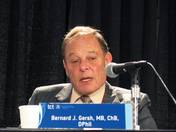SAN FRANCISCO – Giving bivalirudin in the ambulance to patients with ST-segment elevation MI before primary percutaneous coronary intervention significantly improved 30-day bleeding outcomes in a randomized controlled trial in 2,218 patients, compared with giving unfractionated or low-molecular-weight heparin and optional glycoprotein IIb/IIIa inhibitors.
The bivalirudin group showed nearly a 40% decrease in the primary outcome, a composite of death or major bleeding not associated with coronary artery bypass grafting (CABG), compared with the control group. Rates for the primary outcome were 5.1% in the bivalirudin group and 8.4% in the control group at 30 days, Dr. Philippe Gabriel Steg and his associates reported at the Transcatheter Cardiovascular Therapeutics annual meeting.
The 30-day rate of acute stent thrombosis, however, was approximately sixfold higher in the bivalirudin group (1.1%) than in the control group (0.2%) in the EUROMAX (European Ambulance Acute Coronary Syndrome Angiography) trial. That did not translate into an increased risk of infarction, which was similar in the bivalirudin group (1.7%) and the control group (0.9%), Dr. Steg and his colleagues said.
The rates of the main secondary outcome – a composite of death, reinfarction, or non-CABG major bleeding at 30 days – also were significantly lower in the bivalirudin group (6.7%) than in the control group (9.1%), said Dr. Steg, professor of cardiology at Université Paris-Diderot and director of the coronary care unit at Hôpital Bichat, Paris.
The study was published online simultaneously with the presentation (N. Engl. J. Med. 2013 Oct. 30 [doi: 10.1056/NEJMoa1311096]).
The benefit from bivalirudin came mainly from reduced bleeding, not reduced mortality. The risk of major bleeding not associated with CABG was 2.7% in the bivalirudin group and 6.1% in the control group, a significant 57% reduction.
Rates of cardiac or noncardiac death at 30 days did not differ significantly between groups, with cardiac death in 2.4% with bivalirudin and 3% in the control group, and noncardiac death in 0.5% and 0.1%, respectively.
The study was underpowered to assess mortality, Dr. Steg said in an interview. He hopes to assess mortality risk at 1 year by analyzing combined data from EUROMAX and a previous major trial that showed bivalirudin’s utility before percutaneous coronary intervention, the HORIZONS-AMI (Harmonizing Outcomes with Revascularization and Stents in Acute Myocardial Infarction) trial (N. Engl. J. Med. 2008;358:2218-30).
Dr. Steg and his associates conducted the EUROMAX study to see if these benefits were still true in the modern era of prehospital treatment and evolving use of glycoprotein IIb/IIIa inhibitors, platelet P2Y12 receptor inhibitors, and radial access for PCI.
The EUROMAX findings were consistent across subgroups of patients, including subgroups defined by PCI access site or by the choice of P2Y12 inhibitor, Dr. Steg reported at the meeting, cosponsored by the American College of Cardiology.
He believes the findings will change practices and convince emergency crews to choose bivalirudin in Europe, where anticoagulation commonly is started in ambulances before arrival at the hospital, a practice that has not yet caught on in most of the United States.
Dr. Gregg W. Stone, primary investigator of the HORIZONS-AMI trial and a discussant of EUROMAX at the meeting, put together a preliminary meta-analysis of the two studies, he reported. Preliminary results suggest significant benefits from bivalirudin in 30-day rates of major bleeding, transfusion, thrombocytopenia, mortality, and subacute stent thrombosis, with a roughly fivefold increase in the risk of acute stent thrombosis. Studies are warranted to determine whether antiplatelet therapy with cangrelor might be a solution to the acute thrombosis risk, said Dr. Stone, professor of medicine and director of cardiovascular research and education at Columbia University, New York.
Dr. Steg received fees from The Medicines Company, which sponsored the study and markets bivalirudin, and he reported financial associations with 16 other companies. Four of his colleagues in the study were employees of The Medicines Company, and 12 other colleagues reported financial associations with that company and/or multiple other companies. Dr. Stone reported financial associations with Boston Scientific, Eli Lilly, and other companies.
On Twitter @sherryboschert





